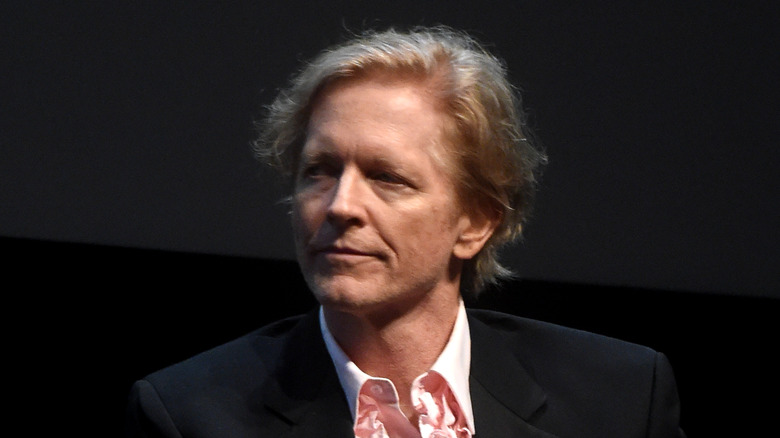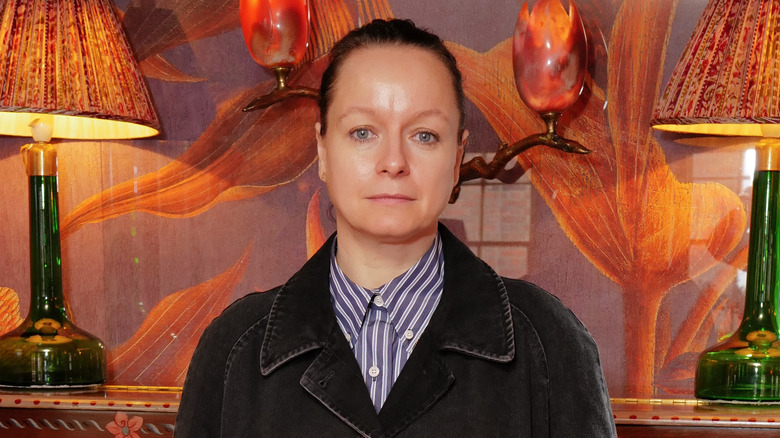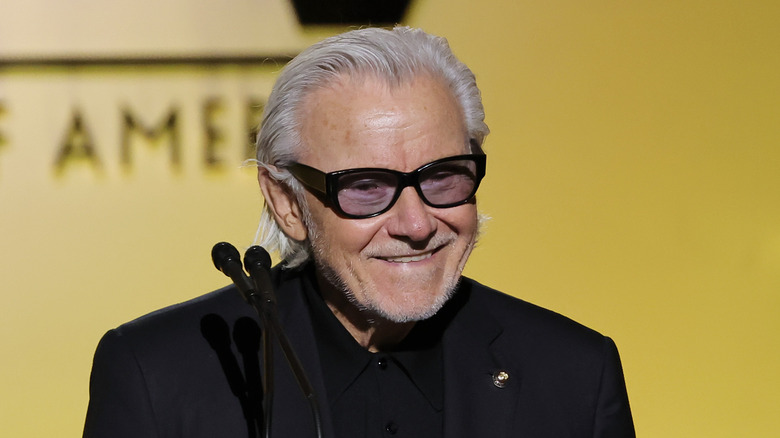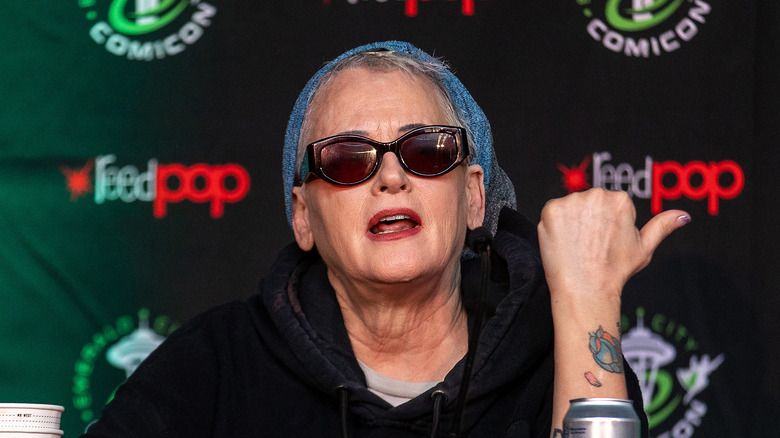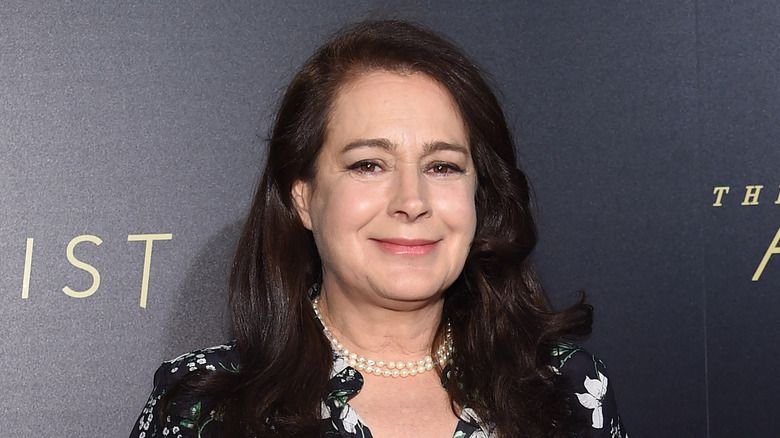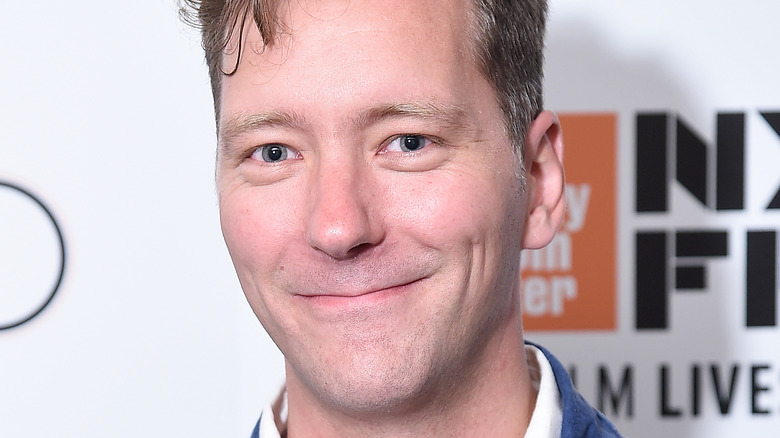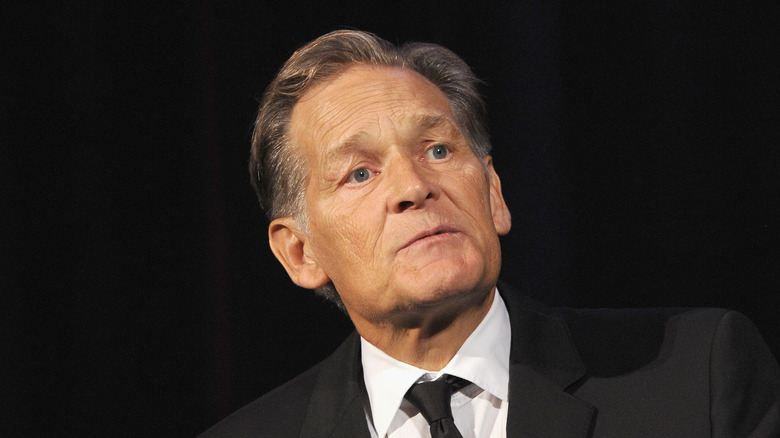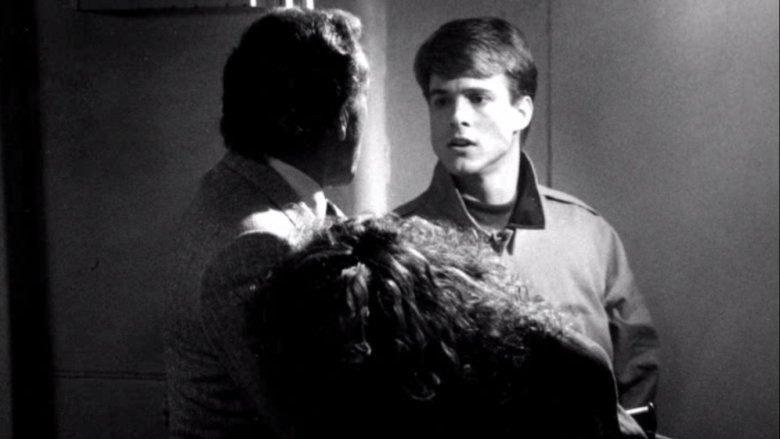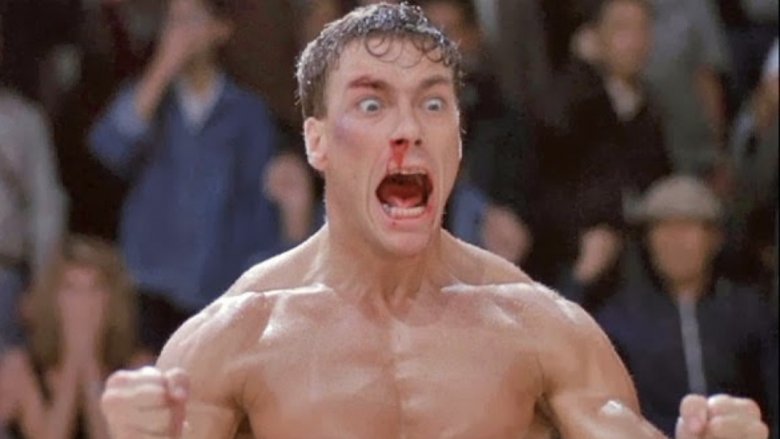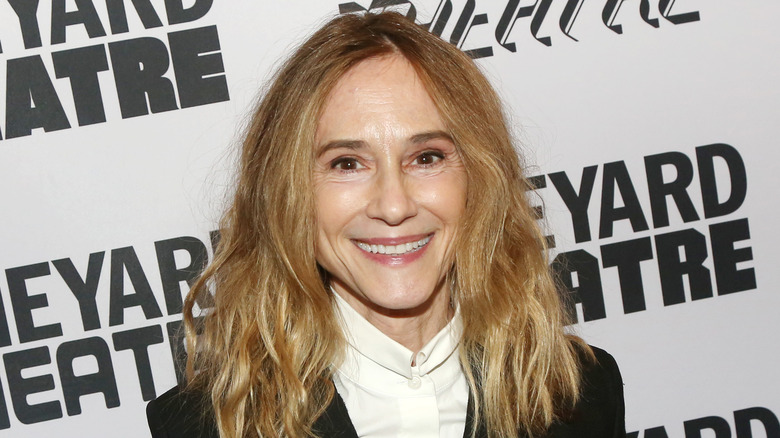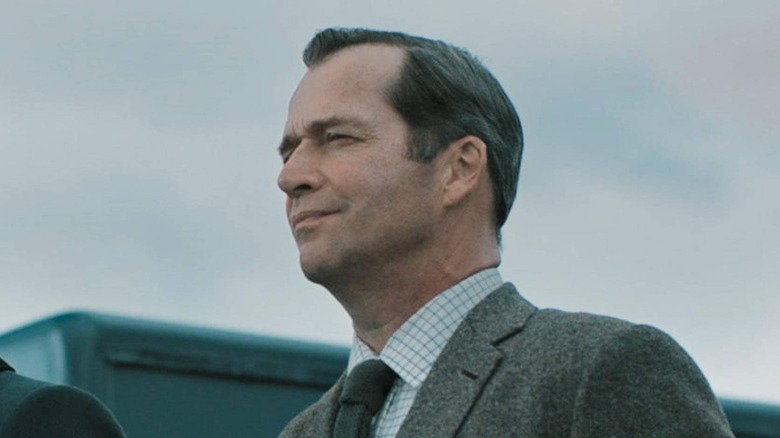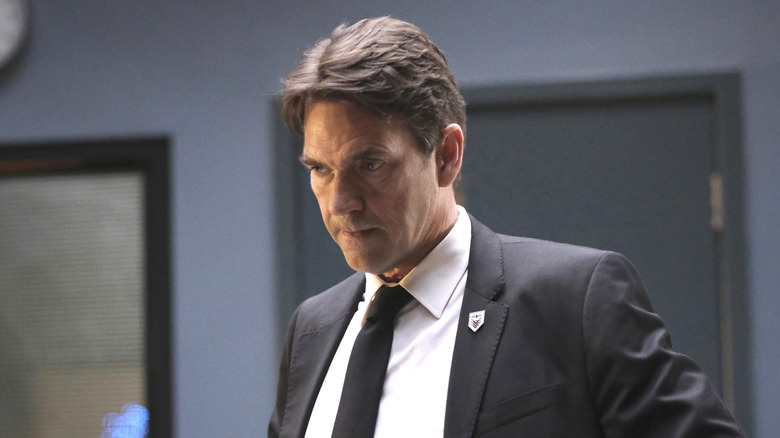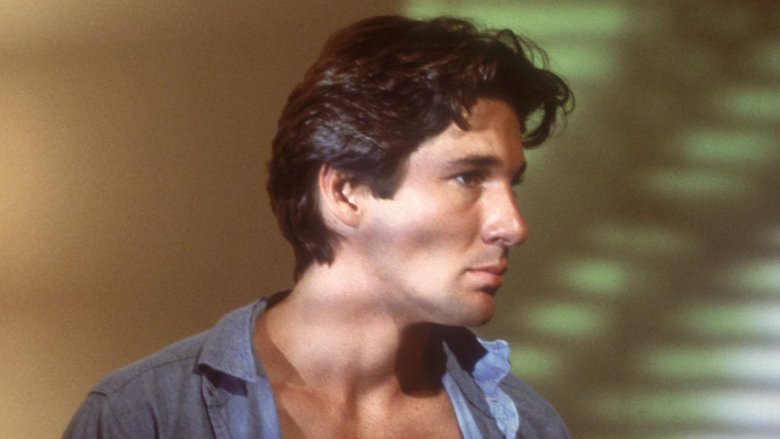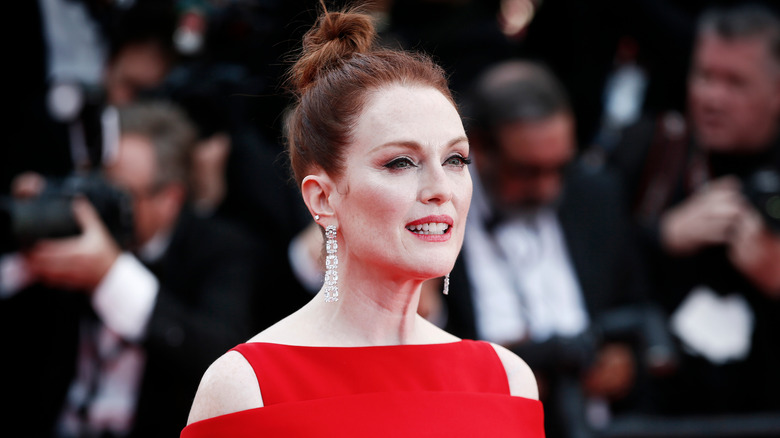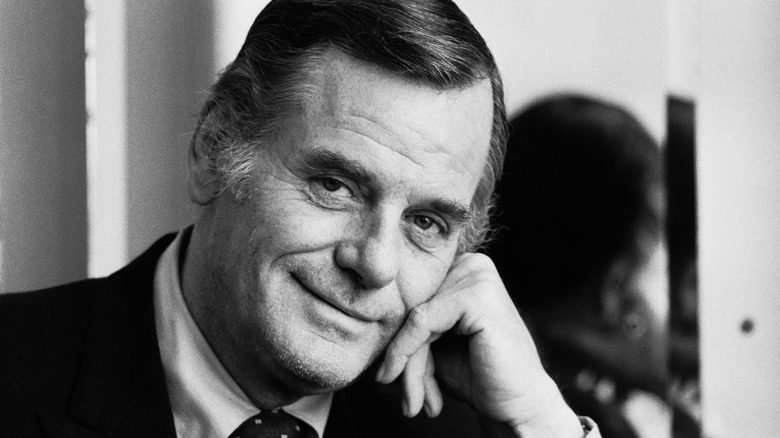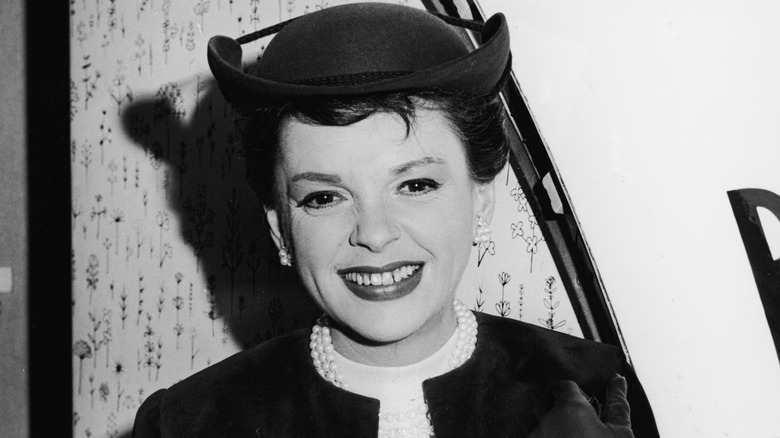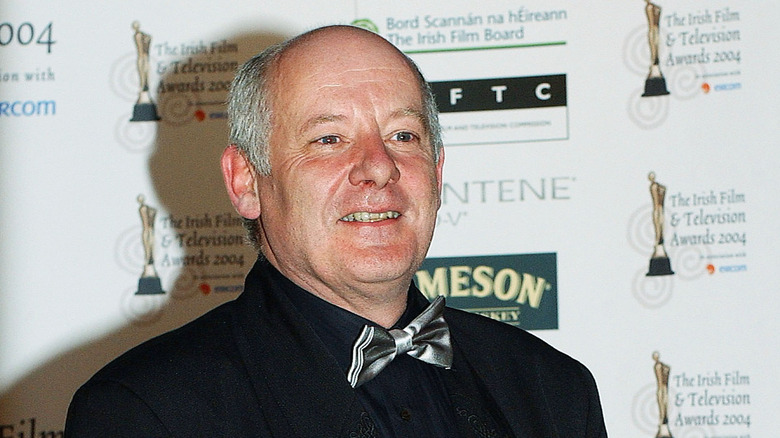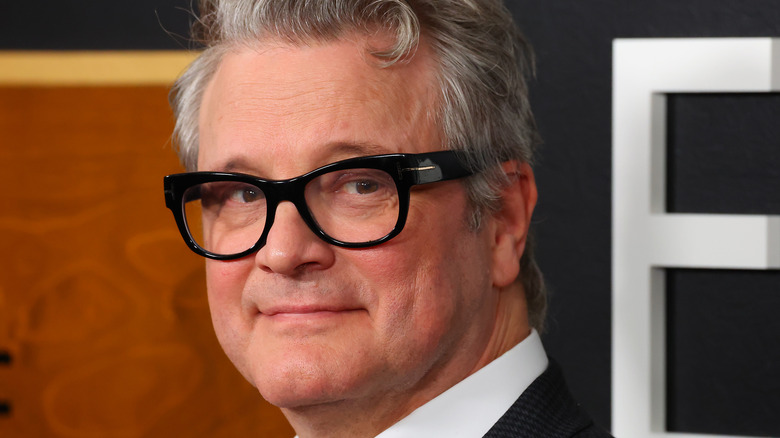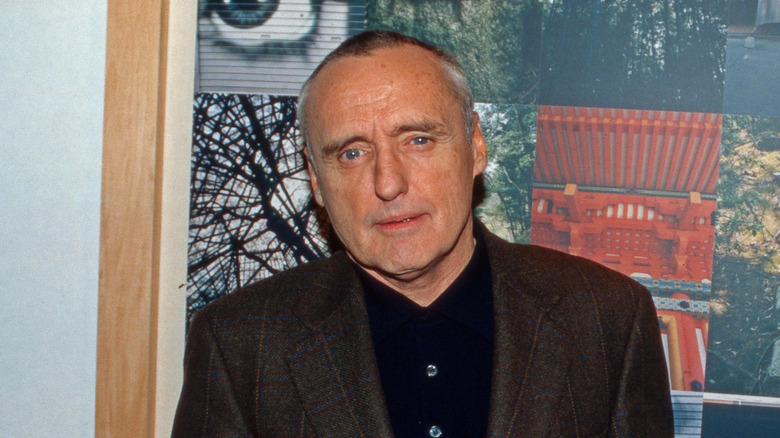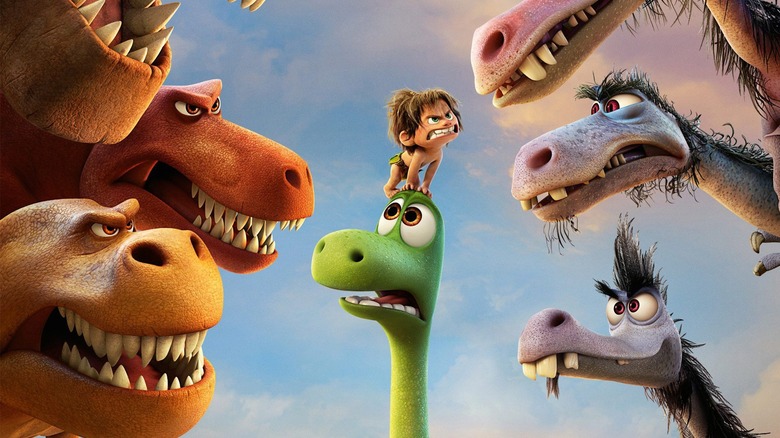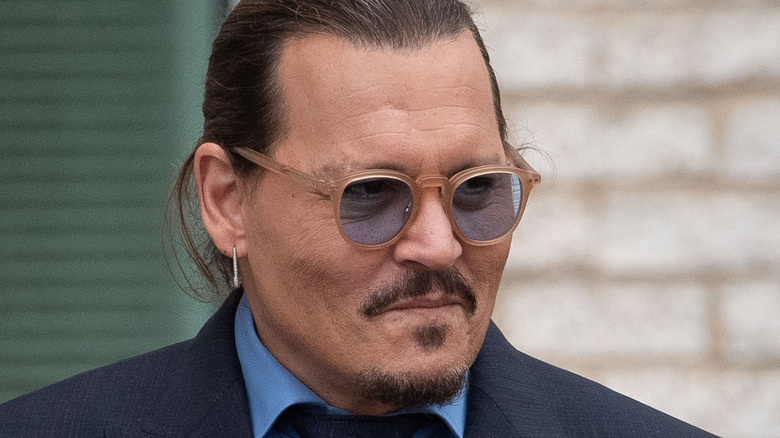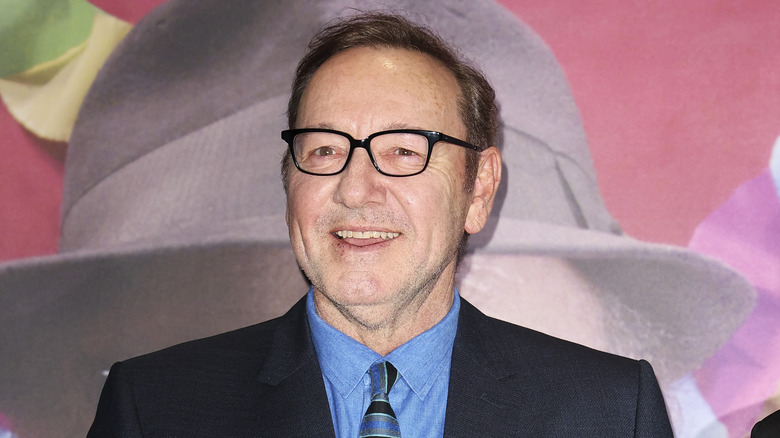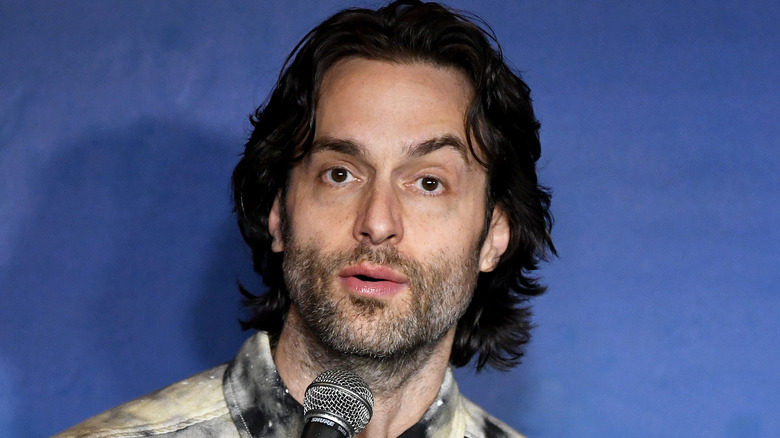Actors Who Were Fired And Replaced During Filming
Everyone who's ever been fired from a job knows it can be a truly traumatic experience — and it's even worse if you're replaced in your role at the company instead of simply seeing the position eliminated. Although it's easy to forget how insecure acting can be as a profession, the threat of being fired and replaced often looms just as large for our favorite stars — even after they've gotten the part.
Landing a high-profile movie role doesn't always guarantee you'll actually be featured in the picture. Just ask any of these actors, who were famously — some might say infamously — fired from their roles and replaced mere weeks, or even sometimes days, after cameras started rolling. How could that possibly happen, and what's a Hollywood star to do after losing a part they thought they had in the bag? Read on to find out, and prepare to see some of your favorite movie characters in a whole new light.
Eric Stoltz
From the get-go, the team behind "Back to the Future" wanted to cast Michael J. Fox in the lead role of Marty McFly. Only they couldn't, because the actor was tied up with shooting his hit TV show, "Family Ties." So they went with another youngster, Eric Stoltz, instead. However, the top people working on the movie (among them director Robert Zemeckis and producer Steven Spielberg) realized weeks into production that Stoltz wasn't getting many laughs in rough cuts of the film. So in a series of awkward moves, they came up with a plan to fire Stoltz and bring in their original choice.
The 2015 book "We Don't Need Roads: The Making of the Back to the Future Trilogy" details Stoltz's painful exit from the project, and sheds light on some of his uncomfortable on-set behavior; according to an excerpt obtained by Vulture, Stoltz went the Method route on set by demanding that everyone refer to him as "Marty." By the time he was booted, some crew members seemed relieved.
Whatever the case, re-casting Stoltz ultimately proved to be a wise business decision; the film went on to gross over $200 million. For his part, Stoltz told Moviehole in 2007 that getting fired was a "freeing" experience in retrospect.
Samantha Morton
In the Oscar-winning movie "Her," the computer operating system that Joaquin Phoenix's character falls in love with was initially voiced by actress Samantha Morton. All went smoothly — until the film's team got to the editing room.
"Samantha was really involved in giving Joaquin [Phoenix] a lot ... to work from. And then when we got into editing, we realized that what Samantha and I had done together wasn't working for what the character needed," director Spike Jonze revealed at the 2013 AFI Fest. "So we ended up having to recast at that point in time." Morton's eventual replacement: Scarlett Johansson, who filmed her dialogue around her "Captain America: The Winter Soldier" schedule, according to the Los Angeles Times.
Harvey Keitel
"Apocalypse Now" was plagued by numerous production headaches, including director Francis Ford Coppola having to fire his leading man, Harvey Keitel, shortly after the film started shooting. Reports claim the two disagreed with the portrayal of Keitel's character, Willard, which Keitel backed up in an interview with writer Jason Matloff. "Long-term, [Coppola] didn't really give in [to my suggestions] because if he had understood the real value of my contribution — having the experience of three years as a Marine Corps rifleman, squad leader, fire team leader — the separation wouldn't have happened," Keitel said.
Keitel was replaced by Martin Sheen — who suffered a heart attack during the infamously difficult production— and "Apocalypse Now" went on to massive commercial success and nearly universal critical acclaim. On the bright side: Keitel added that the two have since moved past their differences. "We're grown men now, and we're certainly friends," he said.
Lori Petty
"A League of Their Own" star Lori Petty was unceremoniously fired by producer Joel Silver after just two days on the set of "Demolition Man," reportedly over "creative differences." Her replacement: a young star named Sandra Bullock.
Petty later spoke about her firing in a 2014 interview with The Daily Beast, calling it "the most uncool day in Hollywood" and adding, "I just treat people the way I want to be treated, so I'd rather not gossip about his unkindness."
Sean Young
Actress Sean Young has been fired from multiple film roles. Included on her list: the 1990 Warren Beatty flick "Dick Tracy." The real reason she lost the role of Tess Trueheart to Glenne Headly remains vague; Jeffrey Katzenberg told the Los Angeles Times in 1990 that Young wasn't "perfectly suited" to play the role, while a profile of Young by Entertainment Weekly said she got the boot "officially for not seeming maternal enough in dailies."
Whatever the case, Young didn't take to the news quietly. While she initially claimed the firing was a blessing — "I don't think I could have survived working with Warren Beatty," she told the LA Times — Young later alleged that she was actually fired for turning down Beatty's sexual advances. Beatty denied the accusations.
Kel O'Neill
Actor Kel O'Neill was the original actor hired to play Eli Sunday, aka the nemesis of Daniel Day Lewis' Daniel Plainview in "There Will Be Blood." But according to The New York Times Magazine, O'Neill had to be replaced about halfway through the film's 60-day shoot. What went wrong? There were reports that O'Neill "suffered from intimidation," presumably from Day-Lewis' Method approach to acting.
Both Day-Lewis and director Paul Thomas Anderson have since denied this; "It just wasn't the right fit," Anderson told the Times, while Day-Lewis gave a more long-winded answer to L.A. Weekly. Whatever the case, O'Neill didn't work out and was ultimately replaced by Paul Dano, who earned a BAFTA nomination for his work in the role.
James Remar
Actor James Remar was quietly fired from "Aliens." Remar originally said he had to leave the project when something urgent came up at home, requiring his attention. Decades later, however, he revealed his real reasons. "I had a terrible drug problem," he admitted in a podcast appearance on Sidebar (via Indiewire). "I had a great career and personal life, and messed it up with a terrible drug habit."
He continued: "I was initially cast as Corporal Hicks, and I was fired after a couple weeks of filming because I got busted for possession of drugs, and Michael Biehn replaced me." Remar said his firing greatly damaged his relationship with director Walter Hill, who secured him his audition for "Aliens," and added that they didn't work together again for 12 years.
Lee Coleman
"Friday the 13th" has never had a reputation for being what you'd call a star-making franchise. In a practical sense, the long-running film series is less of an ongoing narrative and more of a kill delivery system, serving up audiences an assembly line of fresh-faced young actors to be skewered, smashed up, and slain by Jason Voorhees.
This pattern had been in place for a while by the time the series' eighth entry, "Friday the 13th Part VIII: Jason Takes Manhattan," swam to shore in 1989. The movie follows a group of seniors celebrating graduation on a boat en route from Crystal Lake to New York City. One of the students, Sean Robertson, was originally played by actor Lee Coleman, but a few days into production, the filmmakers started to get cold feet regarding Coleman's casting, and made the decision to fire and replace him. It was Coleman's first major film role, and a typically cold introduction to the Hollywood machine.
"He seemed a little uncomfortable," said writer-director Rob Hedden in the documentary "Crystal Lake Memories," talking about the decision to recast. "Thank God for the producers, because they really said, 'There's a problem here, and if we don't correct it now, we're going to have a bigger problem.'" Coleman only shot a few scenes before being replaced by Scott Reeves, thereby missing his chance to star in the worst "Friday the 13th" movie this side of "Jason X."
Jean-Claude Van Damme
Belgian actor Jean-Claude Van Damme was just on the cusp of coming into his own as the world-famous "Muscles from Brussels" when he landed a job opposite Arnold Schwarzenegger in 1987's "Predator." It sounded like perfect casting, with the martial artist seeming like he'd be able to easily stand alongside the likes of Carl Weathers and Jesse Ventura in the 'roided-out action movie. While that may be true, Van Damme was never up for a part on the special ops team — instead, he was meant to play the Predator itself.
Steve Johnson, the special effects artist behind the alien creature in "Predator," described the movie's brief relationship with Van Damme as a hilarious comedy of errors, in which no party knew exactly what the other was expecting. According to Johnson, no one had informed Van Damme that the role of the Predator was practically a glorified stunt man. "They wanted to just tell the guy to hop around like a frog and it was Jean-Claude Van Damme who had no idea what he was getting into," Johnson told the Stan Winston School. "He was just off the boat from Brussels. He thought he was going to show his martial arts abilities to the world."
According to Johnson, Van Damme was furious and dispirited about spending the entire movie inside of a clunky, sometimes-ridiculous looking suit, and was replaced shortly into the production with Kevin Peter Hall.
Holly Hunter
If you ask a million people what their favorite Disney animated movie is, you'll likely hear the title "Chicken Little" approximately zero times. The 2005 theatrical feature is the 46th animated movie from the House of Mouse, and holds the distinction of being the first fully computer-animated movie in the studio's library. As far as that benchmark is concerned, it's no "Toy Story," but it's cute enough for what it is.
Disney got pretty far into production with actress Holly Hunter voicing the lead role of Chicken Little before the decision was made to pivot the movie into more of an action-packed adventure, and reimagine the protagonist as a boy instead of a girl. After eight months of voiceover work on Hunter's part, she was replaced with "Scrubs" lead Zach Braff, with his voice being pitched up in post-production. Critically, at least, the decision to rework the movie didn't really pay off, with "Chicken Little" sporting a direct-to-DVD-worthy 37% score on Rotten Tomatoes.
If Hunter has any hard feelings about being kicked out of the coop for the project, they haven't stopped her from continuing to work with the company. Having also put her talents to much better use as the superheroine Elastigirl in the 2004 Disney/Pixar adventure "The Incredibles," she returned for another go-around as the character in its 2018 sequel "Incredibles 2."
James Purefoy
Playing a masked character in a movie is a risky proposition. There's a serious risk that your performance will go the way of David Prowse's Darth Vader, with your vocals overdubbed by another actor who then gets all the credit. It's got to be a real lousy feeling to see yourself right there on screen, all but invisible, but that's exactly what happened to James Purefoy in the 2005 James McTeague comic book adaptation "V For Vendetta."
Purefoy, an actor known today for roles in "Altered Carbon," "Pennyworth," and "The Following," was originally cast in the Wachowski-produced political movie as V, the masked revolutionary. But a funny thing happened on the way to the wrap party, as Purefoy left the production midway through. While no reasons for his departure were given at the time, it was later reported that the actor quit due to frustration with his costume. According to a later interview Purefoy gave to Total Film (via "Comic Book Movie"), all rumors of that sort were untrue.
"I don't really talk about it much because we agreed not to," Purefoy said. "The only rumor I can scotch is that if anybody thinks I was too p**** to wear a mask, they're completely wrong. It was nothing to do with wearing the mask."
According to Purefoy, his departure came down to "genuine creative differences" that eventually became "intolerable." Though he was replaced in the part by Hugo Weaving, some of his performance remained in the finished film.
Dougray Scott
Hugh Jackman single-handedly made Wolverine into an iconic role with his soulful, sorrowful portrayal of the nigh-unkillable mutant in the "X-Men" franchise. But when the first "X-Men" movie entered production in 1999, Jackman literally wasn't in the picture. Originally, the cigar-chomping Logan was to be played by Scottish actor Dougray Scott, but his participation in the superhero movie was held up by production delays on John Woo's "Mission: Impossible II."
Production on "X-Men" had already begun while Scott was working on the "Mission: Impossible" sequel, but the combination of that movie's delays and a shoulder injury made it impossible for him to make it to work on time. After a month's worth of filming with the rest of the "X-Men" cast, Scott was set to join the production for his scenes on October 18. Just over a week before his expected arrival, it became clear that the arrangement wouldn't work, so Fox brass began a speedy search for a replacement Wolverine.
A then barely-known Hugh Jackman was cast in the role on October 11, ushered into his breakout role in a last-minute whirlwind. It's mind-boggling to consider how much would be different if the "Mission: Impossible" sequel's production had run on time — many careers and movies would have been affected. It just goes to show that in the movie business, as with everything, it's not just skill that gets you to the top. More than anything else, success comes down to good timing and good luck.
Richard Gere
Rumors around Richard Gere don't tend to revolve around the actor being difficult on set, which makes his firing from "The Lords of Flatbush" a bit of a surprise. The 1974 movie, set in the Flatbush neighborhood of Brooklyn, originally starred Gere in an ensemble cast of leather jacket-wearing hoodlums along with Sylvester Stallone and Henry Winkler. Reportedly, Gere was removed from the production as the result of a feud with Stallone that got out of control.
The way Stallone describes it, it was all Gere's fault — naturally. "The original part of Chico, which was played by Perry King, was originally supposed to be played by Richard Gere, but we never hit it off," Stallone said in a 2006 interview with Ain't It Cool News.
Stallone described tension between the two, but Gere's departure was ultimately triggered by a sloppy lunch on set, with Gere spilling mustard onto Stallone's pants while they were scarfing down food in the backseat of a Toyota. In response, Stallone went nuclear. "I elbowed him in the side of the head and basically pushed him out of the car," Stallone said. "The director had to make a choice: one of us had to go, one of us had to stay. Richard was given his walking papers and to this day seriously dislikes me." Honestly, this story just makes us like Richard Gere even more. Who would have thought Rocky Balboa could be such a diva?
Julianne Moore
For a creative industry, the movie business can be awfully risk-averse, particularly when it comes to casting decisions, so the majority of actors who find themselves fired and replaced during filming tend to be less well-known. It isn't completely out of the ordinary for a bankable star to end up out of a gig, however — just ask Julianne Moore, who had the lead role in 2018's acclaimed "Can You Ever Forgive Me?" before the picture's screenwriter and original director, Nicole Holofcener, decided to go in a different direction.
Moore revealed the circumstances of her departure in early 2019, while promoting her role in "Gloria Bell." Saying she hadn't seen "Can You Ever Forgive Me?" because it was still "too painful," but adamant that she wasn't upset with the picture's eventual star, Melissa McCarthy, Moore described her firing as a simple matter of creative differences. "I think she didn't like what I was doing," Moore said of Holofcener. "I think that her idea of where the character was, was different than where my idea of where the character was, and so she fired me."
Even for Hollywood's biggest stars, it can be painful to be fired from a project — especially one that goes on to the type of widespread acclaim and awards season buzz enjoyed by this one. But Moore's still an Oscar-winning talent, and "Gloria Bell" brought in some of the biggest critical raves of her career, so all's well that ends well.
Gig Young
Art imitated life a little too much for Oscar winner Gig Young on the set of Mel Brooks' comedy classic "Blazing Saddles." According to Turner Classic Movies, Young, whom TCM described as a "certified drinker" in real life, got way too drunk for the scene in which his character, the Waco Kid, meets Sheriff Bart (Cleavon Little) and "was carried away with the tremors." Later that day, Young's replacement, Gene Wilder, got on a plane to take over, and the rest is comedy history.
If you or anyone you know needs help with addiction issues, help is available. Visit the Substance Abuse and Mental Health Services Administration website or contact SAMHSA's National Helpline at 1-800-662-HELP (4357).
Judy Garland
Judy Garland's life was as tragic as her performances were beloved. Her physical and mental health problems left her unable to participate in a number of films she was set to star in — two of which had already begun filming before she got fired.
The first of these was the 1950 musical "Annie Get Your Gun." She was fired over a month into a chaotic production that saw her co-star Howard Keel injured from falling off a horse and the firing of director Busby Berkeley, whom Garland had past problems with. In the May 10, 1949 firing letter, MGM exec L.K. Sidney blamed Garland as "responsible for substantial delays." Betty Hutton replaced her in the leading role of Annie Oakley, and Garland parted ways with MGM the following year.
20th Century Fox executives claimed that Garland "resigned for personal reasons" from 1967's "Valley of the Dolls," but Garland claimed she was fired. Reportedly, Garland would not come out of her dressing room for days, resulting in very little usable footage being shot. Co-star Patty Duke has said that Garland was mistreated by director Mark Robson, and rumors circulated about Garland objecting to the content of the script. Susan Hayward replaced Garland in the role of Helen Lawson. This was the final film Garland worked on before her death in 1969.
Garland was also replaced on two other films, 1949's "The Barkleys of Broadway" and 1951's "Royal Wedding," but these had not begun filming when her roles got recast.
Gerard McSorley
Gerard McSorley is an award-winning Irish actor who has starred in such films as "In the Name of the Father," "Omagh," and "The Constant Gardner." When he was cast as police officer Captain Queenan in Martin Scorsese's 2006 gangster film "The Departed," he did research by meeting with Boston police officers and had in-depth conversations with Scorsese and screenwriter William Monahan to develop the character's backstory.
All that work wasn't enough to prevent McSorley from being replaced midway through production by Martin Sheen. The actor didn't seem to have any hard feelings about being fired, telling The Irish Times that he was given exceptional treatment by Scorsese. While no specific reason has ever been given for why Sheen ultimately took over the role, McSorley has speculated that his own obsessive promotion for "Omagh" — which was a very personal project for him — at the time might have interfered with his preparation for "The Departed."
Colin Firth
The "Paddington" movies, based on the classic children's books written by Michael Bond, are some of the most critically acclaimed family films of the 21st century. For a brief time, "Paddington 2" outranked "Citizen Kane" as the most universally praised movie ever made on Rotten Tomatoes. One of the many things that makes this series great is Ben Whishaw's voice performance as the hyper-polite, marmalade-loving bear — which makes it somewhat surprising to learn that Whishaw was a last minute replacement for the previous voice actor.
Oscar winner Colin Firth was attached to voice Paddington in the first movie all the way through production, with a trailer even being released while he was still involved. The amicable decision to replace Firth with Whishaw came during post-production. As reported by Entertainment Weekly, Firth said of the split, "It's been bittersweet to see this delightful creature take shape and come to the sad realization that he simply doesn't have my voice." Director Paul King stated, "We love the voice and we love the bear, but as our young bear came into being we agreed that the two didn't seem to fit."
Dennis Hopper
Dennis Hopper, one of the groundbreaking actors and directors of the 1960s-'70s "New Hollywood," had found a notable niche in the '90s playing villains in films like "Speed," "Waterworld," and "Super Mario Bros." So it makes sense that he was cast as Christof, the all-powerful TV producer controlling Truman Burbank's life in "The Truman Show." However, two days into filming Christof's scenes, which were expected to take around 10 days to complete, Hopper was let go from the film over "creative differences."
Hopper said he had an agreement with producer Scott Rudin that he'd be fired should his work be unsatisfactory. The performance must have been extremely underwhelming, given director Peter Weir was described in "The Truman Show" DVD extras as extremely reluctant to ever remove an actor from a movie. Finding a replacement was difficult, with production set to shut down if the role couldn't be filled in time. Ultimately Ed Harris took the job and earned an Academy Award nomination for the role.
Most of the cast of The Good Dinosaur
The 2015 Pixar flop "The Good Dinosaur" is an unusual case where almost the entire cast of a movie was replaced midway through production. At the D23 Expo in 2013, a voice cast was announced featuring Lucas Neff, John Lithgow, Frances McDormand, Neil Patrick Harris, Judy Greer, and Bill Hader. The finished film featured none of those actors except for McDormand, who played Momma Ida.
Why the complete cast change? Because "The Good Dinosaur" became an entirely different movie in the meantime. Less than a month after D23, the film's original director, Bob Peterson, was replaced by Pete Sohn. The film was having story problems, so Sohn made substantial changes, including making the apatosaur protagonist Arlo younger and changing the style to more of a Western survival story. Given the mixed reception from both critics and general audiences, whether these changes were enough to improve the struggling production remains a question.
Johnny Depp
The announcement that Johnny Depp would play Gellert Grindelwald in the "Fantastic Beasts" movie series proved instantly controversial. In 2016, the same year the first "Fantastic Beasts and Where to Find Them" movie was released, Depp was accused of domestic abuse toward his then-wife Amber Heard in a heated divorce trial. With Depp's portrayal of the villain even more prominent in 2018's "Fantastic Beasts: The Crimes of Grindelwald," the controversy continued, with author J.K. Rowling defending the decision to keep Depp in the series.
After losing his libel case against British tabloid The Sun in 2020, however, Depp was ultimately asked to resign from playing Grindelwald. Depp had already shot one scene for "Fantastic Beasts: The Secrets of Dumbledore" when this decision was made, and he was still paid his full $16 million salary for the production. Mads Mikkelsen ultimately took over the role; the actor made a conscious choice not to imitate Depp's interpretation.
If you or someone you know is dealing with domestic abuse, you can call the National Domestic Violence Hotline at 1−800−799−7233. You can also find more information, resources, and support at their website.
Kevin Spacey
This was a particularly unusual firing in that it happened after filming was already complete and post-production was nearly finished. Ridley Scott's 2017 drama "All the Money in the World" originally had Kevin Spacey in the supporting role of J. Paul Getty. Less than two months before the film's holiday season release date, Spacey was accused of sexual assault amidst rising calls for accountability in the entertainment industry.
In response, Scott did something unprecedented: he reshot all of Spacey's scenes with Christopher Plummer now playing Getty in his place. Most of these scenes were shot in the same locations as the original versions, with only one scene requiring green screen and the digital removal of Spacey from the original footage. Plummer's performance ended up being the most praised aspect of the film, with the then 88-year-old becoming the oldest-ever acting nominee at the Oscars. It became a meme to joke about Plummer replacing any predatory man in any job.
If you or anyone you know has been a victim of sexual assault, help is available. Visit the Rape, Abuse & Incest National Network website or contact RAINN's National Helpline at 1-800-656-HOPE (4673).
Chris D'Elia
Despite the awards and the memes for Christopher Plummer, very few major Hollywood productions have followed the same path of recasting actors accused of horrific crimes post-filming. One of the rare exceptions to this was Zack Snyder's 2021 Netflix zombie movie "Army of the Dead." Comedian Chris D'Elia was originally part of the film, but following a series of sexual misconduct allegations, Snyder reshot all of D'Elia's scenes with Tig Notaro taking his place.
The reshoots reportedly cost millions of dollars, with producer Deborah Snyder comparing the cost to the whole budget of the prequel film "Army of Thieves." Making the process more complicated was that Notaro had to film all of her scenes alone, in front of a green screen, due to coronavirus precautions. All these challenges, however, were worth it, both morally and because Notaro's Marianne Peters ended up being one of the best-liked parts of the film.
If you or anyone you know has been a victim of sexual assault, help is available. Visit the Rape, Abuse & Incest National Network website or contact RAINN's National Helpline at 1-800-656-HOPE (4673).
